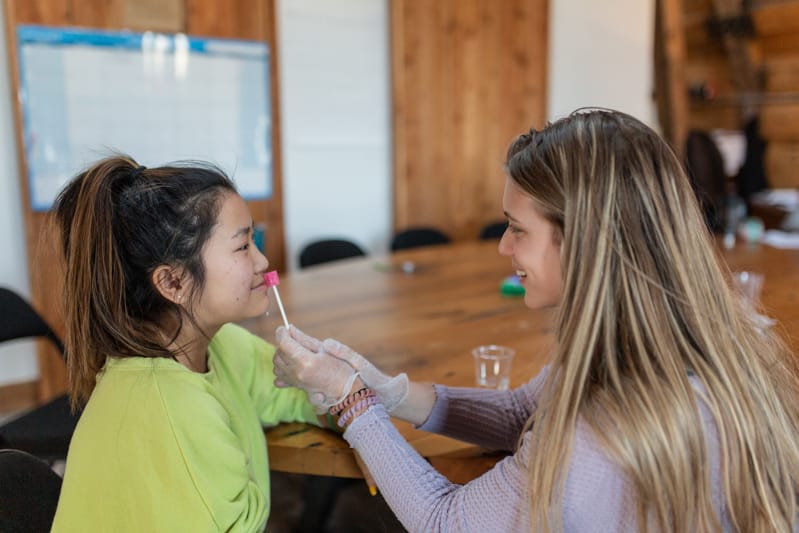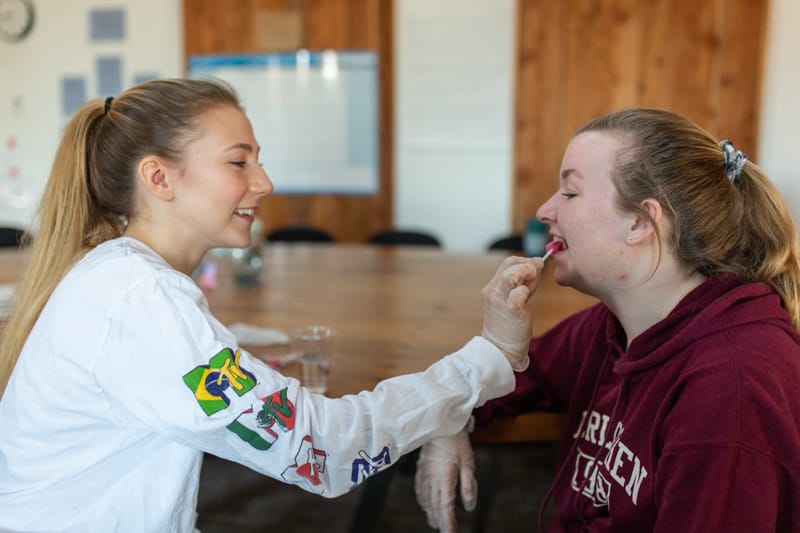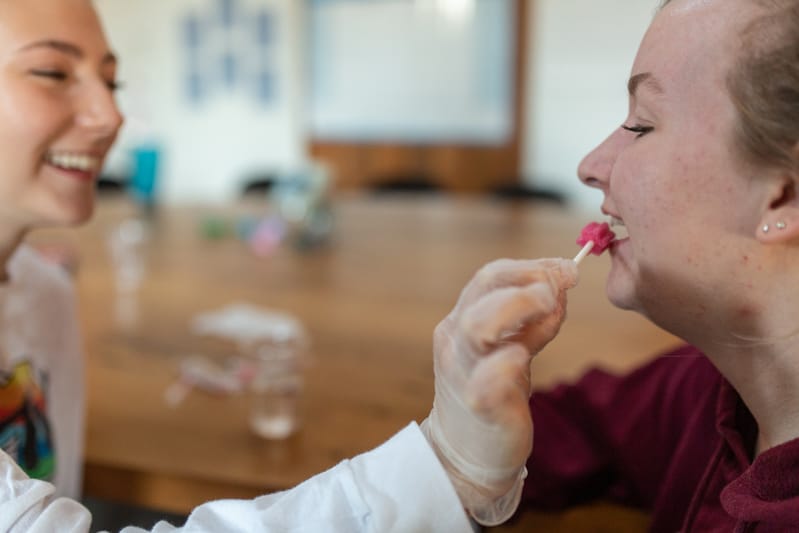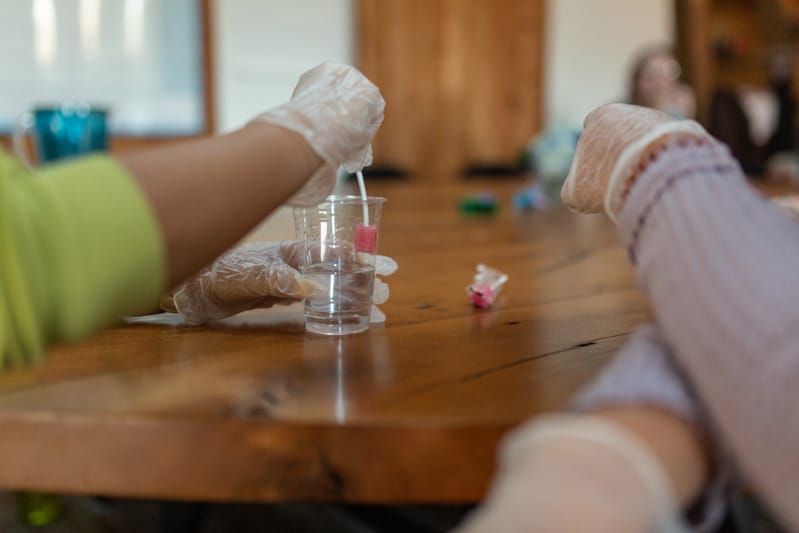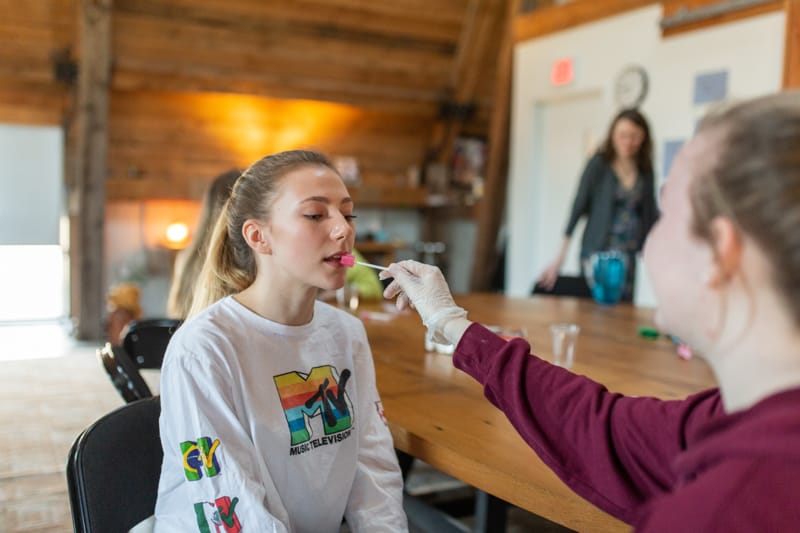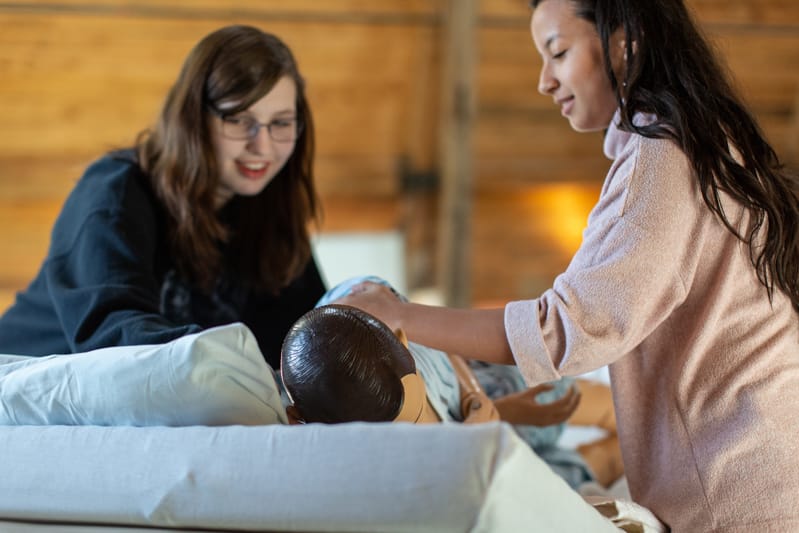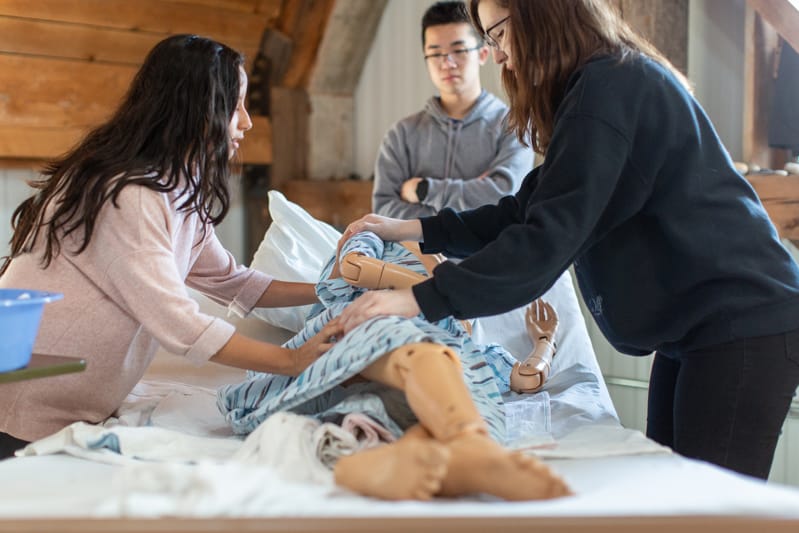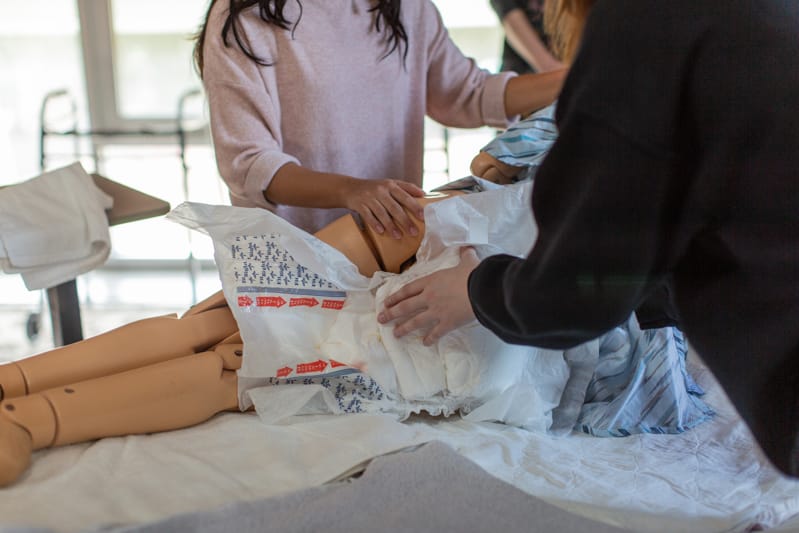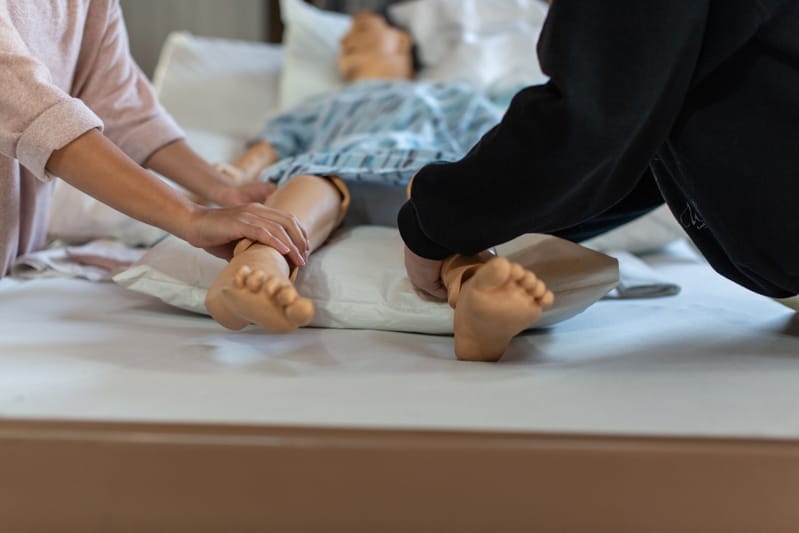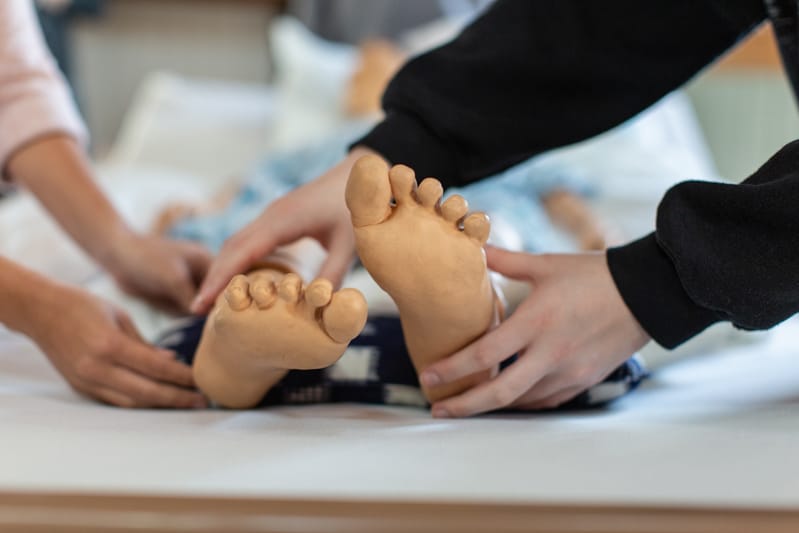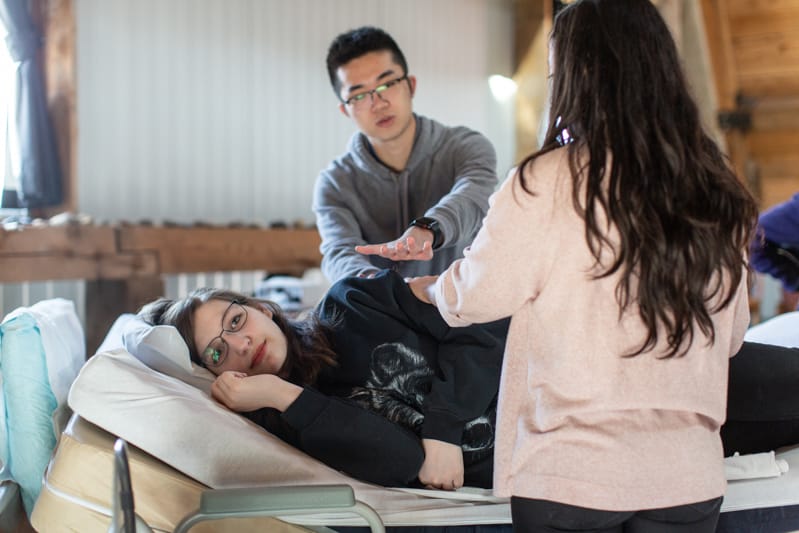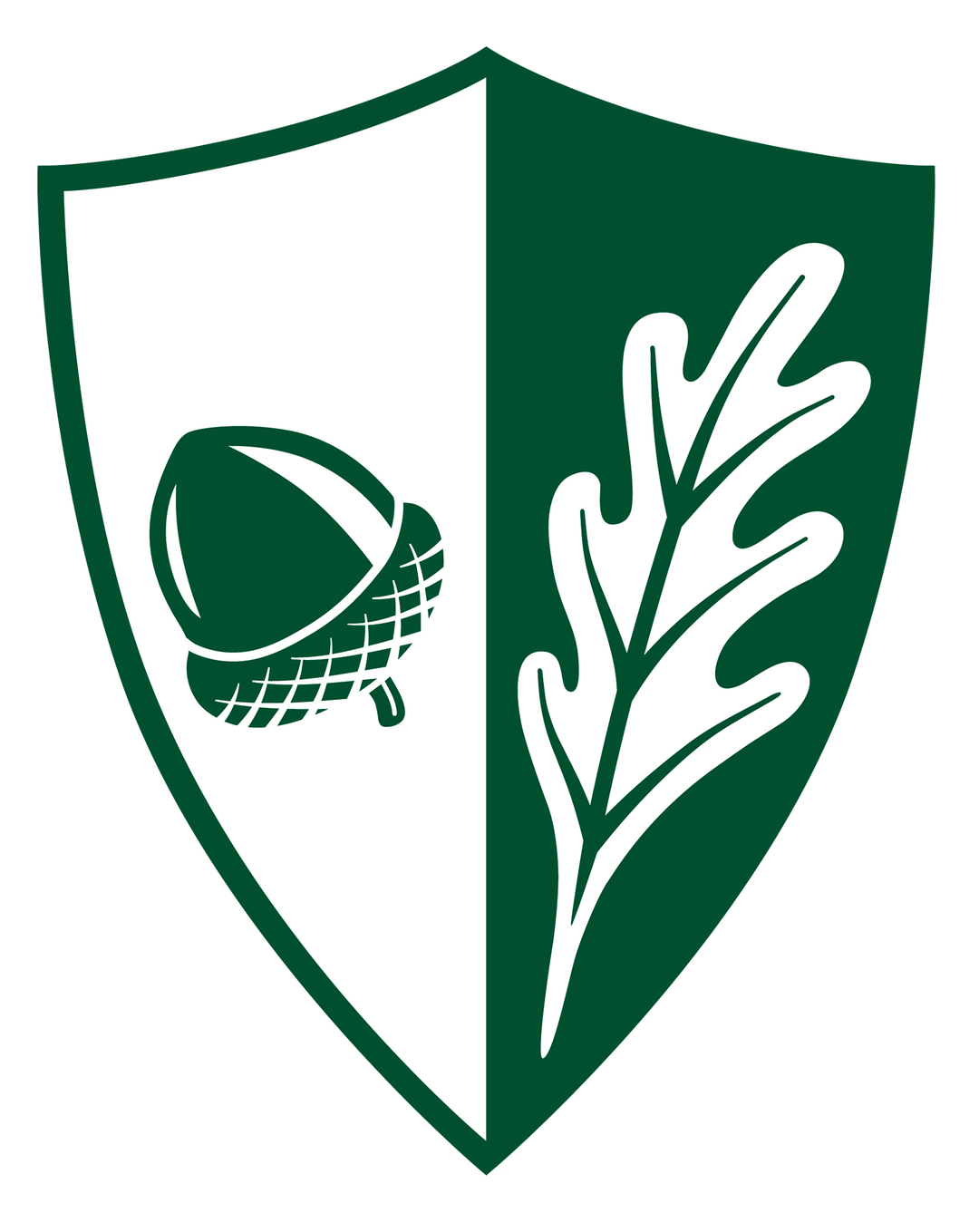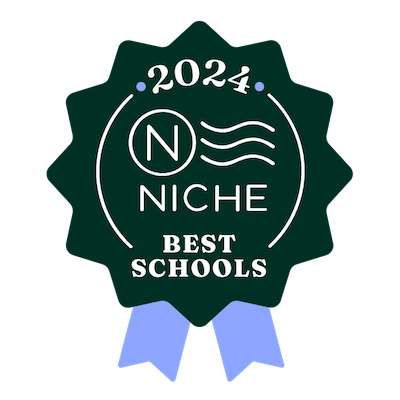Skills
Hands-on and Meaningful
The Hospice Program teaches students the physical, mental, and emotional skills they need to work in a hospice care home, skills which often extend well beyond the classroom. Students learn specialized hospice caregiving techniques such as mouth care, skin care, resident positioning, changing bedsheets, bed baths, lift assists, and foot washing. At the center of these practices are the principles of palliative care, concerned mainly with quality of life and resident comfort.
Many of the hands-on techniques the students learn can be easily transferred to other medical fields, which makes this an ideal course for future nurses, doctors, counselors, and related professions. Students hone their communication skills as well, developing healthy social habits that can benefit their everyday lives for years to come. Mental and emotional skills are outlined in the Mindfulness section.
Hospice Menu
Comfort Care Homes (External Links)
Applying Skills
At the heart of this program are the volunteer shifts that students are encouraged to work at one of six local hospice care centers. Students get a chance to practice hands-on skills in a real work environment, bonding with patients and learning the trials and tribulations of working in palliative care.
For many students, their first shifts are a nerve-wracking experience, and the work they do as volunteers can be both mentally and physically challenging. In-class journaling and discussion are meant to give students the emotional skills they need to cope with the situations they encounter during volunteer shifts.
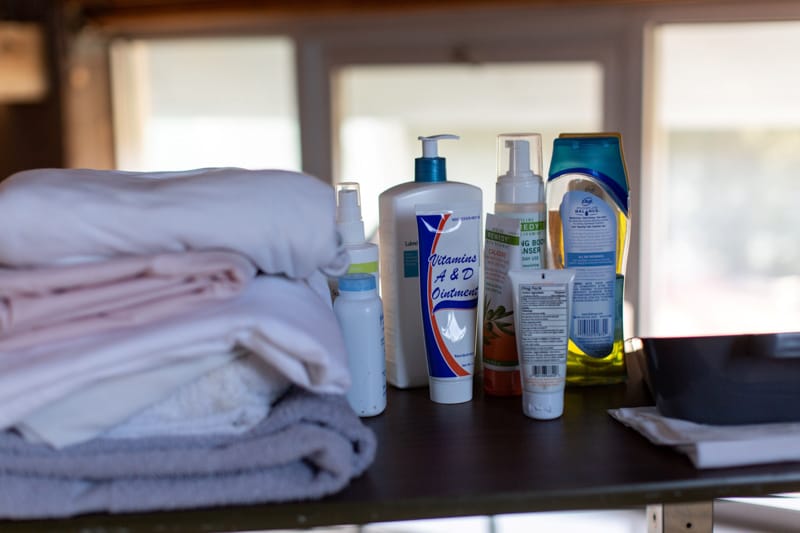
Photo by Amelia Hamilton Photography.
Training Activities
In preparation for the volunteer training that students receive at comfort care homes, they will learn and practice the essential nursing assistant techniques of comfort care using home health equipment and supplies donated by InterVol, including a hospital bed, incontinence pads, disposable briefs, draw sheets, linens, pillows, toothettes, mannequin, wheelchair, walker, crutches, and bedside commode. These hands-on skills include the following:
- Universal/standard precautions
- Mouth care
- Skin care
- Turning and positioning
- Bed making (occupied and unoccupied beds)
- Bed bath
- Lift assists from bed to commode
- Lift assists from from bed to wheelchair/recliner/chair
- Walking assist
- Brief change
- Massage/lotioning
Mouth Care
Students practicing mouth care: Suzannah Sheeran, Charlotte O’Connor, Rory Sommerville, and Rachel Green. Photos by Amelia Hamilton Photography
Mouth care is an important part of comfort care, and is used to prevent dry mouth and infection, since residents may no longer be able to drink water and keep their mouths wet on their own. A dampened oral swab, or toothette, is used to moisten the resident’s lips and mouth, usually while sleeping, after eating, or during a bed bath. Hospice care homes strive to make patients as comfortable and happy as possible, and mouth care is one practice used to accomplish that.
During the in-class lab activity, students practice mouth care on each other, taking turns practicing their techniques and learning what it’s like to be in a resident’s shoes. Technical concerns such as aspiration or biting are important to keep in mind, but empathy plays a major role in these exercises as well. Discussion questions posed throughout the activity help students think about what the residents are going through, considerations that strengthen their social and emotional skills.
Bed Baths
Pictured above: Corey Zhang, Sarah Smith, Nikole Fandino, Sybil Prince, and Andreas. Photos by Amelia Hamilton Photography.
Bed changing and baths are a necessary skill, both in hospice care and in the larger medical field. It’s an ideal lesson for students who hope to be nurses or take care of their own family members. Residents with progressive diseases can develop bed sores from being in one place for too long, so re-positioning them is important to the process as well.
The students first use a damp washcloth to gently wash the resident, working from their face to their feet and placing towels on the bed underneath. Next, the volunteers use the draw sheet to roll the resident onto their side, changing one side of the bed sheets first before switching to the other side. Residents may also have a diaper or bed pan that will need to be changed.
In Their Own Words
In class we’ll learn how to turn the patient or how to get them up to use the commode, how to give a bed bath, but I think the most important one we did was to learn how to have hard conversations.
I’ve never had to be that mature, and calm down and keep a straight head when there’s physical issues going on. I was really nervous of hurting somebody.
You think one mistake and everything’s gonna be your fault, which is really not the case. You just need to practice more and not be too afraid, and you’ll get over it.
When there are awkward times, because sometimes they just want you to sit there with them, in silence…you obviously want to do something in the moment to make them feel better…[you have] to get over that uncomfortableness, because I guess again it really comes back to as long as they’re comfortable and they’re okay.
Growing through Hospice
The nature of hospice care brings students in this program face-to-face with bodily fluids, human anatomy, and fatal diseases — an extremely realistic way to prepare them for the difficult situations they’ll encounter in adulthood. Many students find that although they initially have aversions or discomfort regarding certain types of care, once they find themselves in a position to actually provide that care, they are much more equipped to do so than they think. Guest speakers come into the class and discuss how even if they feel uncomfortable, the resident is probably more uncomfortable, and so it is up to the volunteers to help alleviate that. It’s not all so scary, though, and hospice work is a very rewarding way to make someone else’s life better. The skills learned in this class, both physical and mental, will benefit students forever.
©2023 The Harley School
Community Programs
Community Programs
Summer Programs
Driver Education
Afterschool
Extended Day
Adult Programs
Rentals
Key Programming
Science and Math Integration
Beyond STEM
Sustainability
Biomimicry
Maker Education
Project-Based Learning
Whole Learners
Social Emotional Learning
Civic Engagement
Mindfulness
Hospice
Arts
Visual Arts
Performing Arts
Giving
Supporting Harley
2023 Events
2021-22 Sustainability Challenge
Harley Fund
Planned Giving
College Counseling
 Harley’s Approach to College Counseling is highly individualized and student-centered. Students have direct access to college counselors throughout their Upper School experience, but really, each student is part of a team including faculty, administration, and staff. It’s our job to support each student and we want nothing more than to send students on to the next step of their journey at a right fit school for them. The student centered and driven process is wrapped in care, expertise, and professionalism.
Harley’s Approach to College Counseling is highly individualized and student-centered. Students have direct access to college counselors throughout their Upper School experience, but really, each student is part of a team including faculty, administration, and staff. It’s our job to support each student and we want nothing more than to send students on to the next step of their journey at a right fit school for them. The student centered and driven process is wrapped in care, expertise, and professionalism.
We host college reps during times students are available (no need to miss a class) so they can make connections and learn more about potential schools. We also arrange campus visits for classes as field trips, host an alumni college day (where recent Upper School graduates return to share advice and answer questions), and help connect students with our international alumni network. In fact, representatives from schools all over the world actively seek opportunities to come to Harley and meet with our students!
Our college counselors are accredited and are part of national/global conversations on admission trends. They also attend and present at conferences across the country.
Beginning with our Grade 11 parent night, we offer informational sessions for parents, including one devoted just to financial aid. Our partnership with families is critical, as the college admissions world changes very quickly and having an expert to guide students and families through the process is essential.
Clubs
 “Club Rush” is an afternoon every fall in the Upper School when students have the chance to sign up for clubs for the year, and each year it is very different because new clubs are created based on student initiative and enthusiasm.
“Club Rush” is an afternoon every fall in the Upper School when students have the chance to sign up for clubs for the year, and each year it is very different because new clubs are created based on student initiative and enthusiasm.
A few of this year’s choices: Sports Media, Social Action Club, Journalism Club, Feminism Club, Student of Color & Allies (SOCA), Gay-Straight Alliance, Tri M (music honor society), E-Sports Club, Euchre, Key Club (service), Animation Club, Dungeons & Dragons, Sustainability Club, Jewish Cultural Club, Astronomy Club, Biomimicry, and Beyond Soup (social justice/service).
Athletics
 Each and every year, students at The Harley School participate in HAC Athletics, and their success continues to be impressive, both as students and athletes. Our athletic program is an integral part of Harley, teaching student-athletes invaluable lessons about teamwork, time management, persistence, and competition. Our program allows them to develop physically, mentally, socially, and emotionally as they represent their school on and off the field. They grow, mature, and work hard to be the best teammate they can, while creating lifelong memories with teammates who often remain friends for life.
Each and every year, students at The Harley School participate in HAC Athletics, and their success continues to be impressive, both as students and athletes. Our athletic program is an integral part of Harley, teaching student-athletes invaluable lessons about teamwork, time management, persistence, and competition. Our program allows them to develop physically, mentally, socially, and emotionally as they represent their school on and off the field. They grow, mature, and work hard to be the best teammate they can, while creating lifelong memories with teammates who often remain friends for life.
Helping our athletes to reach their potential are some of HAC’s best assets: our coaches. More often than not, they are drawn from the ranks of our faculty and have a deep understanding of the personalities and abilities of the student-athletes on their teams.
We strive to find the right balance of academics, exercise, and personal growth for everyone. By offering a variety of sports at many different levels, all student-athletes find a sport they can be successful in. It is with great pride and pleasure that my team and I work to enrich the athletic lives of all our HAC student-athletes. Go Wolves!
To learn more check out our athletics page.
Student Leadership
 Our Upper School is filled with formal and informal opportunities for students to take on leadership roles. Whether following passions or learning new skills, student-driven opportunities take many shapes.
Our Upper School is filled with formal and informal opportunities for students to take on leadership roles. Whether following passions or learning new skills, student-driven opportunities take many shapes.
– Independent study: one trimester, full year, and multi-year projects have included automating our solar chimneys, coding handmade musical instruments, or developing a class on financial literacy for underserved high school students.
– Serving on student council
– STEM: Climate curriculum program, biomimicry program, NASA Hunch program
Clubs
“Club Rush” is an afternoon every fall in the Upper School when students have the chance to sign up for clubs for the year, and each year it is very different because new clubs are created based on student initiative and enthusiasm.
A few of this year’s choices: Sports Media, Social Action Club, Journalism Club, Feminism Club, Student of Color & Allies (SOCA), Gay-Straight Alliance, Tri M (music honor society), E-Sports Club, Euchre, Key Club (service), Animation Club, Dungeons & Dragons, Sustainability Club, Jewish Cultural Club, Astronomy Club, Biomimicry, and Beyond Soup (social justice/service).
Hospice
 Unlike this class, death is not an elective. Although it is one of two universal human experiences, our culture often ignores, denies, or misconstrues the true nature of death and dying. What happens when we bear witness to this natural process in the cycle of life and develop our ability to be fully present with others when they need us more than ever? It has the potential to change us deeply and fundamentally while shining a brilliant light on the path of our own lives.
Unlike this class, death is not an elective. Although it is one of two universal human experiences, our culture often ignores, denies, or misconstrues the true nature of death and dying. What happens when we bear witness to this natural process in the cycle of life and develop our ability to be fully present with others when they need us more than ever? It has the potential to change us deeply and fundamentally while shining a brilliant light on the path of our own lives.
With the support of their classmates, teacher, and comfort care home communities, senior students are offered the chance to care for others who truly need their purposeful, non-judgmental attention. In the home-like setting of a comfort care home, opportunities for learning extend beyond a traditional classroom rubric and conventional methods of evaluation. In this course, students will certainly find tangible “learning outcomes” by studying the medical/physical processes associated with dying and the basic nursing assistant skills of comfort care. The ultimate goal, however, will always be rooted in true relationships and connection, which occurs only through empathy and compassion.
Learn more about the Hospice Program at Harley HERE.
Capstone/Independent Studies
 This program utilizes environmentally-focused approaches to education and hands-on learning in order to foster the next generation of leaders through a lens of sustainability and problem-solving.
This program utilizes environmentally-focused approaches to education and hands-on learning in order to foster the next generation of leaders through a lens of sustainability and problem-solving.
Food & Farm: These year-long and trimester-long classes are held outside as much as possible, allowing students to become leaders in our various growing spaces. They cover environmental justice issues as well as hands-on work such as planning and overseeing planting, harvesting, and preparation of the gardens.
Past year-long focus projects have included: Creating a native plant shade garden in the Wild Wood area, redesigning our hydroponic system, overhauling Harley’s high tunnel, and improving the irrigation system for the MicroFarm.
Culinary Arts: These classes have a two-fold purpose: to give students practical skills in cooking and the science behind different techniques in the kitchen, learning about food justice, food sourcing, labor topics, and sustainability.
Past topics have included: Examining a plant-based diet, looking at the carbon footprint of different meals and food preparation methods, proposing a low carbon footprint menu to the dining hall, links between food labeling and environmental issues of food production.
Beekeeping: This one trimester class provides hands-on training in beekeeping, how to be a beekeeper, and safety and other techniques for working with bees. Once trained students help with all aspects of Harley beekeeping such as hive inspections, honey collection and extraction, and teaching students in Lower School about our hives.
Students pick a research topic addressing honeybee health and the larger environmental picture.
Social Justice
 At Harley, our students learn how to evaluate social systems in order to identify complex problems in society through a lens of social justice. They take a hands-on approach to working for a fair, equitable society by researching, exploring and evaluating different perspectives, and offering solutions—both theoretical and practical.
At Harley, our students learn how to evaluate social systems in order to identify complex problems in society through a lens of social justice. They take a hands-on approach to working for a fair, equitable society by researching, exploring and evaluating different perspectives, and offering solutions—both theoretical and practical.
Our faculty integrate social justice into our broader curriculum to assist students in gaining a foundational knowledge about what makes a democracy function. By gaining skills in ideating supportive pathways they become more exposed and experienced to how communities can undergo healing and restorative actions.
Capstone/Independent Studies
 Students may create independent studies with supervising teachers throughout their Upper School experience or, during Grade 12, they can design Capstone projects—intensive collaborations with Harley faculty and off-campus mentors—involving rigorous academic study and culminating in public presentations. They are empowered to create their own curriculum, set goals, and work on time management skills in order to accomplish their objectives.
Students may create independent studies with supervising teachers throughout their Upper School experience or, during Grade 12, they can design Capstone projects—intensive collaborations with Harley faculty and off-campus mentors—involving rigorous academic study and culminating in public presentations. They are empowered to create their own curriculum, set goals, and work on time management skills in order to accomplish their objectives.
Independent Studies run the gamut from The Psychology of Sports to Furniture Design to The Neuroimaging of Alzheimer’s Disease. Capstones, meanwhile, are as diverse as the students who pursue them: Fictional Rochester, Autobiographical Art, Biomimicry Education, Organic Fuel, and Rochester Refugees.
Indicative of Upper School curiosity and creativity, pursuits such as these distinguish our graduates in college. Through deep dives of this sort, Harley students master more than speaking, writing, and computing: they learn to communicate, advocate, collaborate, organize, listen, and empathize.
About
About Harley
Fast Facts
Our Faculty & Staff
History
Horizons at Harley
Dining Services
Key Programming
Science and Math Integration
Beyond STEM
Sustainability
Biomimicry
Maker Education
Project-Based Learning
Whole Learners
Social Emotional Learning
Civic Engagement
Mindfulness
Hospice
Arts
Visual Arts
Performing Arts
Main Menu
About
Academics
Key Programming
Enrollment
Community Programming
Alumni
Athletics
News
Giving
My.Harley
Enrollment
Enrollment at Harley
Enrollment Events
Virtual Tour
How to Apply
Affording Harley
Transferring to Harley
Refer a Students
Academics
Divisions
Academics at Harley
Nursery
Nursery 3
Nursery 4
Lower
Middle
Upper
College Counseling
Visiting Reps
Student Counseling
Library

